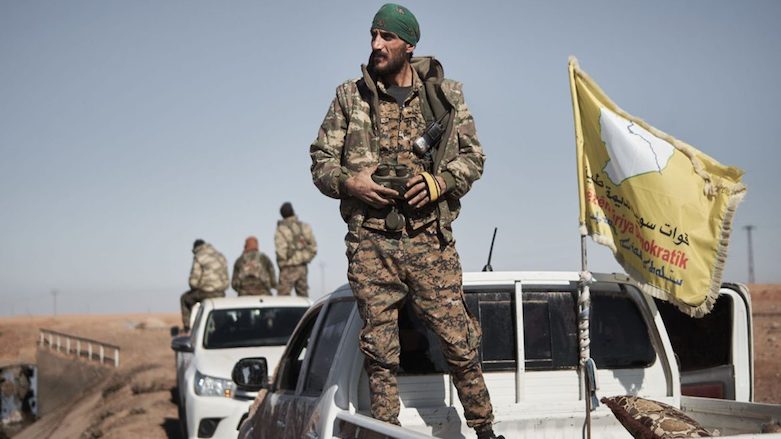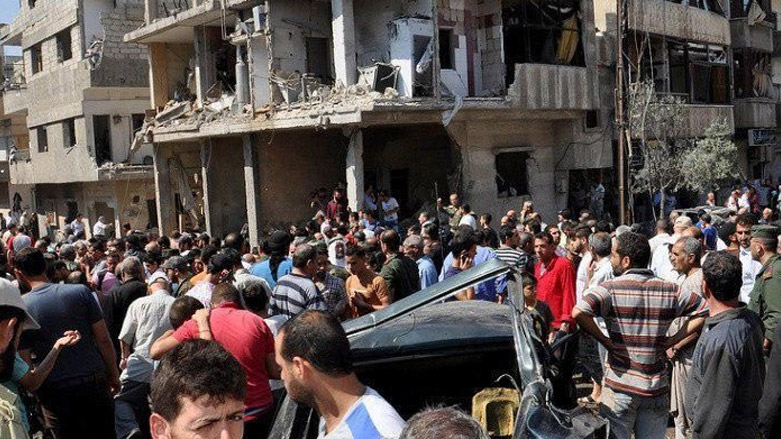US-backed SDF ready to help Sweida’s women taken by IS

KOBANI (Kurdistan 24) – The US-backed Syrian Democratic Forces (SDF) on Sunday said they are ready to exchange Islamic State (IS) prisoners for civilians kidnapped by the militant group from Sweida.
Experts say it is a sign the Kurds are reaching out to the autonomy-minded Druze minority.
On July 25, IS killed over 250 people in the city of Sweida, inhabited by the Druze religious minority, which is an offshoot of Islam incorporating elements of other faiths.
During the attacks, IS kidnapped hundreds of other people, mostly women.
“We, the Syrian Democratic Forces, and in our belief in the unity of the common destiny of all the people of Syria, express and assure our people in Sweida city and the families of the abductees our full readiness for any exchange with elements of [IS] we have detained to liberate the abductees and return them to their families,” the SDF said.
The SDF is holding hundreds of IS fighters, women, and children captured in the fight against the extremist group.
The Kurdish-led People’s Protection Units (YPG) also said they are ready to defend the Druze people.
“We declare that we are ready to protect them wherever necessary. This attack is as burdensome and painful for us as an attack on Kobani and Jazira,” the YPG said.
“We do not distinguish between these attacks and those against Sweida. The YPG is ready to dispatch forces to liberate it from terrorism,” Sipan Hemo, the head of the YPG, told Asharq Al-Awsat.
According to Qusay Sheikho, a member of the Kurdish Centre for Studies, civilians have always been a priority for SDF forces. “In my opinion, the SDF forces see the case of the abducted Druze civilians [as] an ethical responsibility," he said.
“They have done so previously in Raqqa, where mostly Arabs were the victims of the terrorist group. Furthermore, SDF is an alliance that contains all Syrians from all religious and ethnic groups.”
Nicholas A. Heras, a Washington-based analyst for the Center for a New American Security, told Kurdistan 24 that the SDF believes it is a movement for all Syrians.
“Of course, the SDF would want to help the Druze, regardless of some political differences they might have because of the Druze connection to Assad,” he concluded, referring to the Syrian President.
However, experts say the statements by the YPG and SDF also have a political purpose.
Hans Scholl, a researcher on local history and politics in Syria, told Kurdistan 24 that the recent statement comes against the backdrop of detente and talks between Damascus and the Syrian Democratic Council (SDC).
“It shows a gesture of goodwill to the central government, signaling the willingness of SDF to commit its forces alongside SAA and other loyalists under some kind of unified command,” he said.
Earlier, Kurdish officials also said they were willing to fight militant groups in Idlib.
According to Scholl, there is a longstanding pattern of attempted outreach by Syrian Kurds to the Druze, which can be traced back at least to the founding of the SDC, if not earlier.
“The PYD and other parties backing the DFNS [Democratic Federation of Northern Syria] project remain at least nominally committed to the dream of building a new, decentralized order for all of Syria, not just the North,” he said.
Just like the Kurds, the Druze of Sweida are already known to be somewhat inclined toward autonomy.
“This makes an obvious choice for another minority-led regional autonomist movement to reach out to.”
The researcher added that these recent moves show “that as the SDF negotiates an uncertain future with Damascus, it’s already scanning the room for any potential friends it can make to build whatever strength it can in a hostile environment.”
Editing by Karzan Sulaivany

